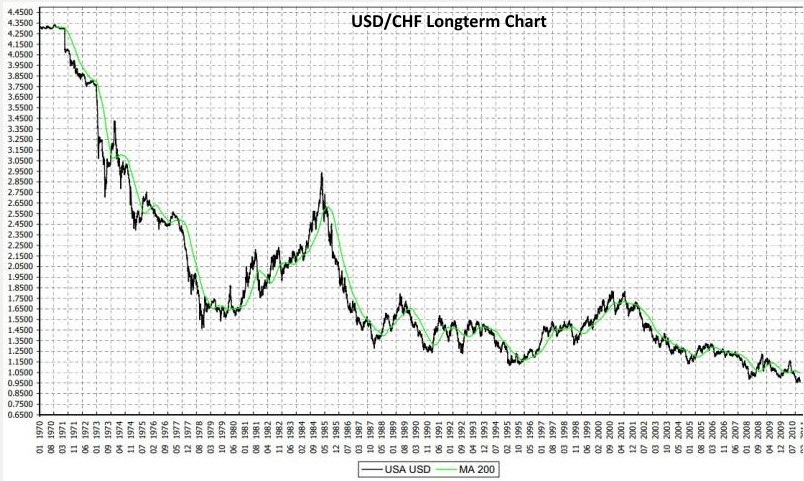Do you really believe in the asset allocation your client advisor proposes?
For example a balanced portfolio, 40% in government and corporate bonds, 20% in cash, 30% in stocks and 10% in precious metals like gold and silver? Is 10% precious metals enough to hedge against a crisis?
Or your portfolio currently contains even more cash?
UBS’s biggest and most sophisticated clients currently hold 70% of their portfolio in cash. Should you really keep the cash in your local currency? Aren’t there other currencies that might beat the dollar, are there currencies that might beat the euro?
Or you are American?
Have you ever thought that holding your cash in US dollars is risky, given that the Fed does everything to destroy your currency?
Do you have already a substantial part of your investment in gold?
Do you think that the Dow-Gold ratio might fall back to levels of 50 in the year 2000 down to 1 like in the inflation periods in the 1970s and early 1980s? You are worried that access to gold or other precious metals might get restricted, or you think that gold is currently already overvalued?
Think about a more global investment strategy and move out of the dollar! Take a more globally oriented asset-allocation without being concentrated only on gold as alternative !
Ever thought about the Swiss franc, the Japanese Yen or the Singapore Dollar as additional hedges against the Fed’s money printing?
This is the long-term chart of the USD/CHF, for the Swiss currency there are no longer-lasting ups and downs like with gold:
We double-check the quality of your asset-allocation into different asset classes. Our advisors help you to diversify your cash holdings.
Get a second opinion on your portfolio now:
[easy_contact_forms fid=7]
Our advisory principles
Advisors are coaches, not players. They motivate and assist their clients in completing all the actions necessary to implement the plan and thus achieve their financial goals. Most clients have a vague list of worries that reflect more anxiety and frustration than direction. A good coach on your team can make a big difference in the outcome of the game, but the contest is still ultimately in the hands of the players. Your active participation is necessary to secure your financial future and cannot be delegated.
The advisors that work together with SNBCHF.COM strive to act as you would if you had our time and expertise.
But without you taking a real role in the process, we would be unable to gather the information and resources needed to help you set and meet reasonable and realistic goals. Without committed participation, the process of assisting clients to meet their stated financial goals can end up frustrating both parties.
This scenario is very different from dealing with brokers or agents, who may only be interested in satisfying the suitability rule in order to sell their products and services. Without the burden of acting in their clients’ best interests, they may be personable to work with, but wealth management isn’t just about the relationship. It is about reaching your goals, and sometimes the most effective coach can’t be your best friend too.
The best advisors are quantitative and analytical. They may buy you lunch or send you a birthday card, but their genuine strengths lie elsewhere. Expert advisors have substantial knowledge and offer sophisticated services.
To extend the sports metaphor, if a fiduciary advisor is a coach, then brokers and agents are there just to sell you equipment. But a shin-guard salesperson isn’t going to help you play a better game of soccer. Personality can be an effective sales tactic because salespeople know you are most likely to say “yes” to someone you like. In contrast, a good coach is not your buddy but rather someone who asks things of you. But he or she is also going to support you with a winning team and help you interact with that team to score goals.
A player can’t sit back in the bleachers like a fan and cheer the team on. When you as the client are not interested in understanding enough of the investment strategy to play your position, you won’t be able to achieve your goals.
Don’t trust any investment strategy you don’t understand, and don’t trust any advisor who won’t or can’t take the time to explain exactly why and how he or she operates. An advisor’s investment philosophy is the most important and valuable resource you are purchasing. If you don’t trust your advisor’s knowledge and techniques, you shouldn’t entrust your financial future with them. In other words, don’t invest in anything with anyone that you either do not understand or with whom you feel uncomfortable.
“Distressed emerging market risk arbitrage” may be a surefire way to make loads of money, but if you don’t understand the process and feel at ease being part of the team that executes that move on the field, you would be better off sitting on the bench and investing in Treasury bills.
Note that I am not advocating “invest in what you know,” which is called familiarity bias and can cause your portfolio to be inadequately diversified. Only investing in what you know may help you avoid some crazy investment schemes, but the resulting concentration can be dangerous in other ways.
Instead, the better rule of thumb is “know what you are investing in,” which requires active participation by both you and your advisor. It is best to have an advisor who is a patient and skilled teacher or mentor at heart. And to be a good coach, your advisor should be willing to contradict you when it will help you better meet your goals. At the end of the day, your coach will still be your coach, but you should also be a better player as a result of the relationship.
With a good advisor, your investment approach should be simple and straightforward enough that you understand why the approach is being taken and how it is being implemented. It should never be a black box where you put your money in the top, let the advisor crank the handle and hope the return that comes out the bottom is good enough to meet your goals.
The box should be sufficiently transparent so you know these three simple pieces of information. You know how others are making money off your investments, you know what your investments are composed of and you know how and by what measure your portfolio will be monitored and reviewed.
Sales pitches are notorious for trying to confuse investors about the real composition, execution and compensation structure of the underlying investment. They generally ask investors not to worry about the details and to trust the reputation of brainy academics or else look at the pictures in the glossy four-color brochures instead.
Don’t be fooled and don’t be foolish. Understanding your investment strategy is critical to safeguarding your investments against reckless schemes. With a good coach and mentor, you can become a better team player and help your family achieve both their financial goals and peace of mind.
See more for























